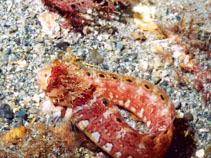| Family: |
Stichaeidae (Pricklebacks), subfamily: Chirolophinae |
| Max. size: |
15 cm TL (male/unsexed) |
| Environment: |
demersal; marine; depth range 20 - 80 m |
| Distribution: |
Eastern Pacific: Aleutian Islands, Alaska to San Miguel Island, southern California, USA. |
| Diagnosis: |
Dorsal spines (total): 53-55; Dorsal soft rays (total): 0-0; Anal spines: 1-1; Anal soft rays: 37-42. Caudal rounded (Ref. 6885). Color variable- males brownish, sometimes with a red tinge; pale spots rimmed with darker on sides of body; spots fainter, smaller, and more numerous dorsally on sides; light on lower part of head with several brown streaks; white on pelvic fins and anterior part of anal fin; other fins with brown pigment spots in bands forming faint bars. Females nearly plain brown on body; in line spread along middle of dorsal fin about 13 dark spots each surrounded by a clear area to form prominent ocelli (Ref. 6885). |
| Biology: |
Usually in intertidal and subtidal rocky areas (Ref. 2850, 51666). Sometimes hides in crevices and tubeworms holes with only head protruding (Ref. 2850). |
| IUCN Red List Status: |
Not Evaluated (N.E.) Ref. (130435)
|
| Threat to humans: |
harmless |
Source and more info: www.fishbase.org. For personal, classroom, and other internal use only. Not for publication.
